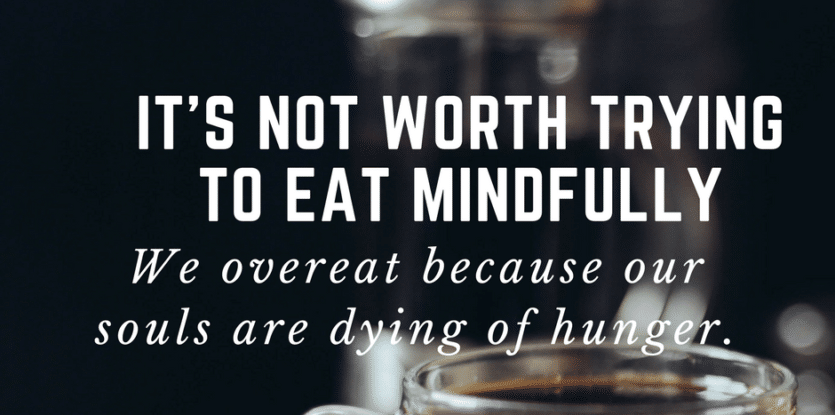The people looking to learn how to eat mindfully are specifically the ones that “mindful eating” won’t work for. A normal person, meaning a person who is not regularly compelled to overeat, has no problem eating mindfully. She eats her food, stops when she’s full, and eats again later when she’s hungry. She is capable of eating one square of dark chocolate and savoring it — she needs no “practice” in order to do so. She has her occasional peccadilloes, much like a social drinker who every so often will have one too many, but she isn’t particularly concerned about her eating habits. She isn’t filling an emotional void with food.
If someone is a compulsive overeater, no amount of “eating mindfully” will stop her from eating a bag of candy and a box of cookies at her desk while she works for the afternoon. There is no “mindful” when the compulsive overeater is passing the donut shop and says to herself, “You’ll just get one today.” There is no “mindful eating” when there is a leftover cake in the office kitchen going stale, and it’s a slow day in the cubicle, and all the frosting on the cake needs to be eaten with one’s fingers. There is no “mindful eating” when the pan of brownies is a little burned and nobody else wants to eat them. There is no “mindful eating” when the French fries are getting cold and she’s already full. There is no “mindful eating” when a compulsive overeater has eaten carefully in front of guests, and finally the guests have gone home.
When you are the kind of person who can’t stop overeating and needs to Google “mindful eating”, you’ve got to realize that you’re dealing with an addiction. Compulsive overeating is like alcoholism and drug addiction. Can an alcoholic “mindfully” drink alcohol? “I’ll just drink this one glass of wine mindfully, breathing with awareness every sip,” he says to himself, only to wake up three weeks later in a detox center. Despite his best intentions, he is unable to control his drinking through mindfulness. Perhaps a few times he is able to slowly savor one alcoholic beverage, but inevitably he ends up on a bender. And like every addiction, overeating is a result of a void.
“Mindful eating” — like the rest of the new-age diet industry (macrobiotics! raw foods! colonics! juice fasting!) — is a good way to sell books and retreats, and a horrible way to try to recover from compulsive overeating. (These modalities may be healthy for people who are not compulsive overeaters, but unfortunately are frequently sold as a way to “stop food cravings for good!”.) The reason so much “eating mindfully” literature is consumed (pun intended!) is because compulsive overeaters will try the same ineffective stuff over and over and over — and will pay anything — to try to get control over their eating. But, you can’t pay your way out of an emotional or spiritual deficit. We overeat because something deeper is dying of hunger.
Compulsive overeaters are not able to use tools like eating mindfully until they are already in recovery and abstinent from their destructive behavior. In order to recover, the overeater needs to join a community of recovering compulsive overeaters. Community isn’t enough, though — you need to see your eating disorder for what it is: an emotional and psychological problem with an emotional and psychological solution. What are you really hungry for?
If you are struggling with overeating, instead of trying to fight the urge head-on, begin looking for the underlying causes of your cravings. What are you really seeking when you are full but are still munching on the cookies? We are all longing for love — to be loved for who we are. We are all longing for transcendence — for a connection to the eternal. Don’t allow your mouth to replace your soul. Consuming food will never compensate for a disconnection with your psyche’s deeper aspirations.
Go deeper into this subject: Bread from Heaven | Mystical Meals | The Power of Five Seconds | Having Intention
Join the Soul Gym to Unlock Your Trapped Potential
Get free exercises to your inbox for self-mastery and growth.








This was spot on and beautifully written. Thank you.
Unfortunately, the Rabbi seems the have fallen into a common trap: assuming a psychological or spiritual cause for what may be, in part or in whole, a physiologically caused problem.
This is actually the approach taken by many of the support groups referred to. However,while some people do over eat compulsively for psychological or spiritual reasons, there are frequently physical issues involved. Recent research has revealed that for some people the eating compulsions actually have a physical basis. Some times diet change, or even being mindful of having a physiological based compulsion can be a great help.
On the other hand telling someone who may have a genetic predisposition to overeating that there must be a psychological cause not only doesn’t help, it may actually make if more difficult for the over-eater to control his/her behavior. The first step in addressing the over eating problem should be explore what physical or genetic factors may be involved.
Years ago, mothers were told that their children were autistic because they were not with their babies engaging enough. Many mothers suffered terrible unneeded guilt because of this approach. It is just as destructive to diagnose people with a spiritual or emotional problem because they have eating compulsions. Chemical imbalances, metabolic problems and/ or genetic issues will continue to exist no how many counseling sessions they are subjected to.
Very interesting and well-written article!